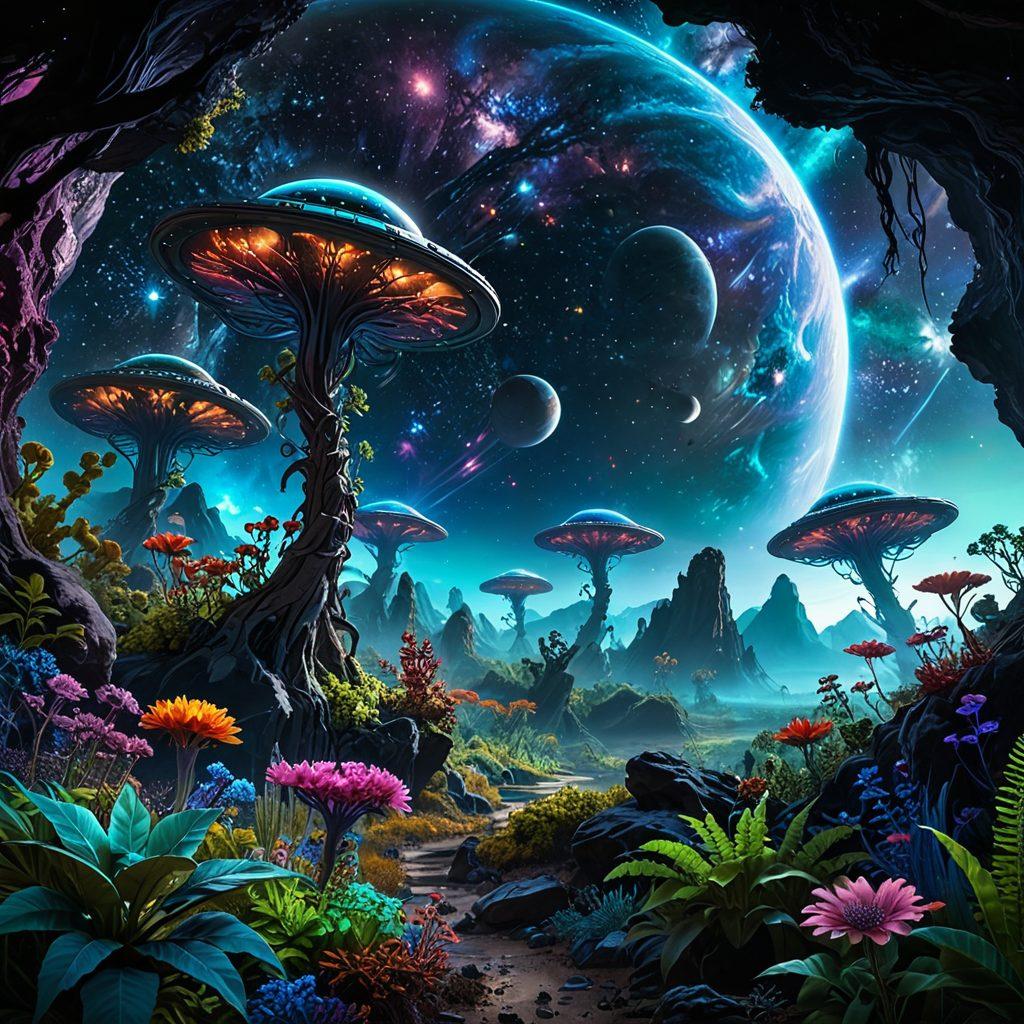Navigating the Cosmos: Unveiling the Mysteries of Deep Space and Exobiology
Imagine soaring through the cosmos, where the stunning brilliance of a nebula dances before your eyes, formed by the stellar remnants of countless celestial bodies. It stirs the imagination and sparks our curiosity about what lies beyond our own Milky Way galaxy. This mesmerizing journey through deep space transcends the realm of mere scientific observation; it offers a glimpse into the vast potential of life beyond Earth, a concept at the heart of space science and exobiology. In this blog, we will navigate the intriguing intersection of space exploration and exobiology, shedding light on the mysteries hidden within the swirling colors of intergalactic nebulae.
In the vast expanse of outer space, every nebula serves as a cosmic laboratory, where stars are born and the building blocks of life may form. The study of these astronomical treasures is crucial for understanding our own origins and the potential for life beyond Earth. Space researchers diligently assess the celestial chemistry of nebulae, uncovering the universal properties of molecular clouds that may indicate conditions favorable for life. What if our future exploration missions reveal that the essence of life we know exists not only on our planet but throughout the cosmos?
Have you ever gazed up at a starry sky and wondered what it would be like to stand amidst the breathtaking beauty of a nebula? Perhaps you’ve pondered the possibility of extraterrestrial beings thriving within these vibrant cosmic clouds. As we propel our spacecraft into deep space, we are thrust into the heart of cosmology and exobiology, where every finding challenges our understanding of life itself. Through space studies, we connect the dots between the astronomical discoveries of today and the fascinating prospects of tomorrow's cosmic discoveries.
Moreover, the integration of scientific organizations focused on space research is a beacon of hope in our quest for answers. Collaborative efforts from around the globe are essential, as they facilitate the sharing of knowledge and resources, providing us with insights that might otherwise remain beyond our reach. From the analysis of solar flares to lunar expeditions, these exploration missions are essential steps in unraveling the complexities of the universe. Could the collaboration between astronomers and astrobiologists hold the key to revealing life’s elusive blueprint?
As we journey onward through this spectacular nebula, let us remember the profound significance of our quest. Each discovery pushes the boundaries of our understanding and builds a bridge to universal knowledge about our existence. We are not merely studying stars and their explosions; we are looking for echoes of life, sentiments of cosmic wanderers throughout time. So, the next time you find yourself under a blanket of stars, take a moment to appreciate your place in this grand cosmic narrative - an eternal quest for connection and understanding in the vast, awe-inspiring world of space exploration.
Unlocking the Cosmic Secrets: Stellar Discoveries from the Milky Way and Beyond
As we gaze into the vast expanse of intergalactic wonders, it’s impossible not to be captivated by the stellar discoveries locked away in the cosmos. From the brilliant hues of a nebula to the astonishingly vast Milky Way, space science sparks a sense of adventure that beckons the curious mind. With emerging technologies and exploration missions paving the way for better understanding, the cosmos holds secrets that are just waiting to be unveiled. Have you ever wondered what lies beyond our familiar surroundings? What mysteries are hidden deep in outer space?
In the world of astronomical science, every new finding opens the door to more questions than answers. Take, for example, the study of dark matter and dark energy—two enigmatic forces that make up about 95% of the universe. As cosmology evolves, our quest for knowledge intensifies. Did you know that many renowned scientific organizations, like NASA and ESA, are currently working on innovative space research to unlock these cosmic riddles? The promise of new technologies and exploration missions fuels our hope that one day, we may grasp the intricacies of the universe itself.
What if we could uncover the conditions suitable for life beyond Earth? Exobiology is at the forefront of this inquiry, guiding space studies to better explore the potential for extraterrestrial life. Imagine stumbling upon a celestial body that holds the key to understanding life on another planet! As we delve deeper into the mysteries of deep space, we're not just searching for answers to our own existence; we are also piecing together a more significant cosmic puzzle, one that could untangle the history of the universe. How exhilarating is it to think we might not be alone amidst the stars?
The beauty of space exploration lies in its accessibility to those willing to dream big. Real-life stories of astronauts and scientists reveal a world where curiosity reigns supreme. For instance, the return of the Perseverance rover from Mars promises to share stories of the Red Planet like never before. From finding biosignatures to analyzing soil samples, this mission embodies the essence of what it means to be an explorer in the universe. What impact do you think this will have on our understanding of celestial life?
As we continue our journey through the cosmos, it's crucial to stay engaged with the findings of space research and share that passion with others. Each new discovery not only broadens our understanding of the universe but also inspires new generations of explorers. By fostering a sense of wonder, we encourage further exploration in the field of astronomical science. After all, the universe is universal, and the quest for knowledge within it belongs to us all. So, let us step boldly into the unknown, ready to embrace the cosmic secrets that await us beyond the Milky Way!
The Science of Life Beyond Earth: Insights into Exobiology and Deep Space Mysteries
Imagine standing beneath a starry sky, your gaze fixed on the endless expanse of the Milky Way, each twinkling star a reminder of the mysteries of the universe waiting to be unraveled—a nebula of questions about life beyond Earth enveloping your thoughts. What if beyond those stars, hidden deep in outer space, lies a cosmic tapestry of life forms, waiting to be discovered? This curiosity drives the science of exobiology and the continual exploration of deep space, pushing humanity towards an exciting frontier of exploration missions and astronomical discovery. In the realm of space studies, the quest for understanding intergalactic biology is not just a question of
,
,
,
,
,
],
Explain . ",
We will explore what makes the search for life beyond our planet invaluable to space research today.,Indeed,"as the great Carl Sagan once said, “The cosmos is within us. We are made of star-stuff.” This declaration speaks to the very heart of exobiology, a field that seeks to understand the potential forms of life that could exist on other celestial bodies, from Mars to the icy moons of Jupiter. But why is this journey so important? As we journey into deep space, we pave the way for astronomical science to not only expand our knowledge of the universe’s origins but also to humankind’s role in it and our impact on different environments. Every mission, every spacecraft sent out with instruments designed for space exploration, serves as a beacon of hope, promising that one day we might not only observe the cosmos but also connect with it. The questions we grapple with—Are we alone in this vast universe? What does life require to thrive beyond Earth?—drive the passion and innovation among scientists committed to these explorations. “Life,” many astronomers surmise, “could exist in forms we can scarcely imagine,” and every ‘what if’ leads to thrilling new possibilities.,Another exciting aspect of exobiology is the search for extraterrestrial life in extreme environments on Earth, which serves as a model for understanding life’s resilience across the cosmos. From hydrothermal vents to acidic lakes, scientists are discovering organisms that thrive in conditions once thought uninhabitable. This knowledge is not merely academic; it enriches our understanding of the potential habitats where alien life might exist. The more we learn about these extraordinary adaptations, the more we appreciate the notion that life could be as universal as the cosmic clouds of gas and dust, previously grouped as nebulae, out of which stars—and potentially life—are born. What if tomorrow's discovery of a microbial organism on a distant exoplanet challenges everything we thought we knew about life?,As we harness technology in our space exploration efforts, our scientific organization harnesses powerful telescopes to peer into the depths of the universe, unveiling answers to mysteries that have persisted for centuries. The Hubble Space Telescope, for example, has transformed our understanding of the universe, revealing the intricate dynamics of galaxy formation and how the elements created within stellar explosions contribute to the building blocks of life. In this interconnected universe, each astronomical event not only marks the birth or death of distant worlds but reminds humanity of our shared existence among the stars. How fascinating it is to think every atom in our bodies was forged in the heart of a star billions of years ago? This cosmic reconciliation offers a picture of our universal kinship with everything that exists.,Ultimately, the pursuit of exobiology and the mysteries of deep space are about more than just searching for aliens; it is about understanding ourselves and our place in the universe. Space research provides a unique opportunity for humanity to unite in our quest for knowledge, igniting passion across generations. The collective effort to understand the universe can inspire a sense of wonder in us all, beckoning us to engage with the cosmos well beyond our earthly confines. So, as you look to the sky tonight, remember: not only are we descendants of the stars; we are their perpetual students, navigating the cosmic seas in search of answers and perhaps, in the process, discovering ourselves.


